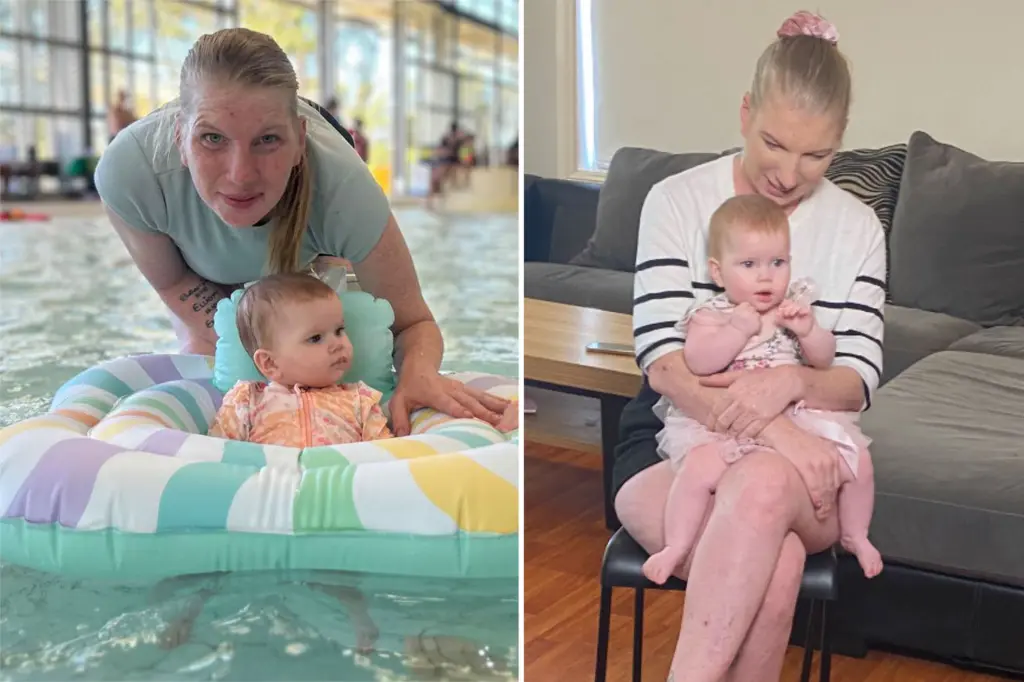A Mother’s Stand for Breastfeeding Rights: A Tale of Dignity at the Pool
In a world where motherhood intersects with public spaces, one Sydney mother’s experience has sparked important conversations about breastfeeding rights and dignity. Yolanda Shipley, a 32-year-old mother of five, found herself at the center of controversy during what should have been a joyful birthday celebration for her six-year-old daughter at the Blacktown Leisure Centre Stanhope Gardens. Despite initial hesitation due to body confidence issues, Shipley acquiesced to her children’s pleas and joined them in the baby pool. When her seven-month-old became hungry, she made the natural decision to breastfeed while sitting in the shallow water with just her legs in the pool, simultaneously keeping a watchful eye on her four-year-old daughter. What followed was an unexpected confrontation that would leave her feeling embarrassed and discriminated against, yet ultimately determined to stand up for her rights and those of other nursing mothers.
The incident unfolded when a lifeguard approached Shipley and instructed her to exit the pool, citing concerns about breast milk contaminating the water or the possibility of her baby vomiting in the pool. Despite Shipley’s attempts to explain that she was within her legal rights to breastfeed in public spaces—a right protected under Australia’s Sex Discrimination Act of 1984—the staff remained firm in their stance. “They were like, ‘That’s just our policy. Sorry, but you’re going to have to get out of the pool and feed your baby somewhere else,'” Shipley recounted. Feeling embarrassed and invalidated, her family decided to leave the leisure center. This interaction prompted Shipley to research the legality of breastfeeding in public spaces, particularly in swimming pools, confirming her belief that she had been wrongfully asked to move.
Following her research, Shipley contacted the leisure center directly to discuss their policy with a duty manager. Unfortunately, this conversation proved equally frustrating as she felt dismissed and talked over when attempting to share the information she had learned. The manager maintained the position that feeding in the water wasn’t allowed due to contamination risks and suggested Shipley could send an email if she was dissatisfied. Shipley argued a critical point often overlooked in such debates: breast milk is not a biohazard and poses no threat to pool water, especially in a chlorinated environment. She further noted the irony that nursing mothers often leak milk anyway, meaning there was likely already breast milk in the pool regardless of whether anyone was actively breastfeeding.
When approached by news.com.au, a spokesperson for Blacktown City Council offered a different perspective on the incident. According to the council, staff had not asked Shipley to stop breastfeeding entirely but rather to step out of the water for “safety and hygiene reasons.” The spokesperson elaborated that “Breastfeeding while in a pool can create risks, as a baby could slip from a parent’s arms, swallow pool water, or vomit milk into the water.” When Shipley moved to sit on the pool edge, staff reportedly asked her to move further back for similar safety and cleanliness concerns. The council emphasized that their staff “acted responsibly and with genuine care for everyone’s safety, comfort and wellbeing,” and noted that Blacktown City Council participates in the Australian Breastfeeding Association’s “Breastfeeding Welcome Here” program, asserting that they have no policy restricting breastfeeding in any of their facilities.
The Australian Breastfeeding Association has taken a clear position supporting Shipley’s right to breastfeed at the pool. A spokesperson stated, “The Australian Breastfeeding Association supports breastfeeding at swimming pools, as breastmilk does not pose a risk to other swimmers in chlorinated pools. Australian law protects a mother’s right to breastfeed in public, including at swimming pools, ensuring mothers can feed respectfully, comfortably and confidently.” The organization also mentioned that they are working with Blacktown Leisure Centre to achieve “Breastfeeding is Welcome Everywhere” recognition, suggesting that the center’s handling of this situation may not align with best practices for supporting nursing mothers in public spaces.
For Shipley, this experience has transcended a personal inconvenience to become a matter of principle and advocacy. She countered the council’s safety concerns by arguing that her baby would have been at greater risk if she had been walking around the pool perimeter while breastfeeding and attempting to supervise her other children. The emotional impact of the incident was significant; Shipley described it as “really upsetting” and admitted that such a confrontation had always been her “biggest fear” as a breastfeeding mother. Determined to prevent other mothers from experiencing similar treatment, she has filed a complaint with the anti-discrimination board. “I’ve read stories of other mothers going through this in the past and I just don’t want anybody else to go through this or feel the way I did ever again,” she expressed, highlighting the broader significance of standing up for breastfeeding rights in all public spaces, including swimming pools. As society continues to navigate the intersection of public health policies and individual rights, Shipley’s experience serves as a reminder of the ongoing need for education and sensitivity around the natural act of breastfeeding.














